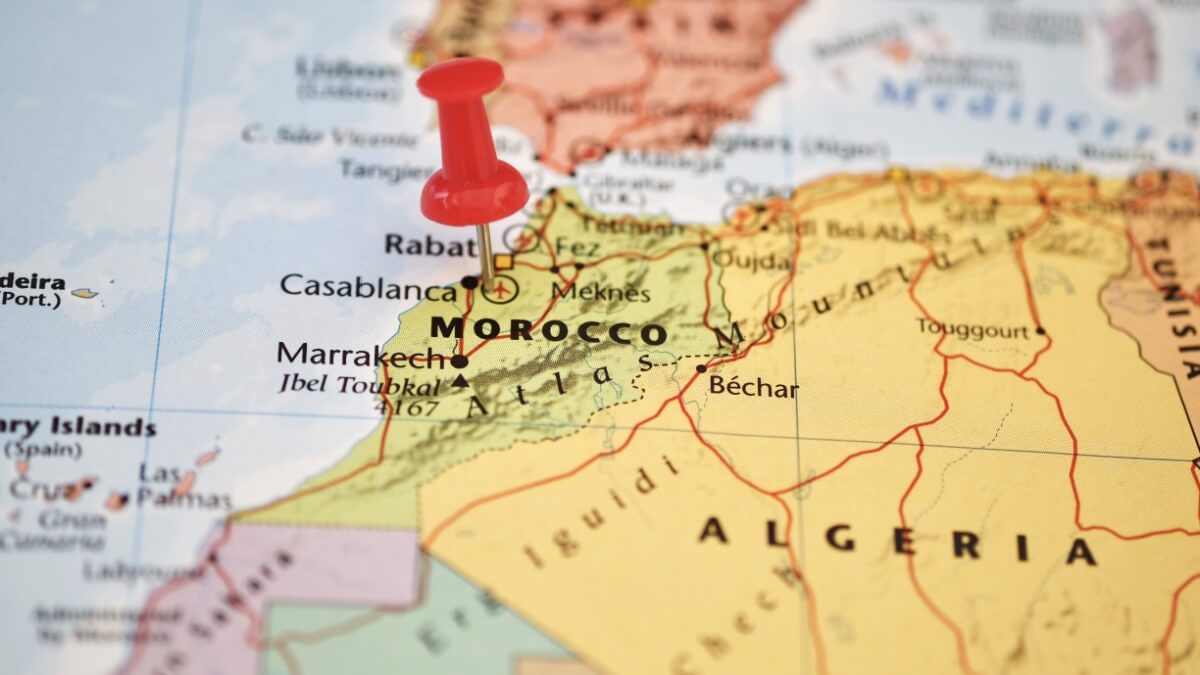How to Start a Business in Poland from the UK
An essential guide on how to start a business in Poland from the UK, including info on getting on the company register in Poland.

Are you planning to do business in Morocco? Then it's essential to understand how corporate income tax works and what it means for your company operating in this North African market.
Morocco offers an attractive business environment with its strategic location bridging Africa and Europe, but navigating the corporate tax landscape requires careful planning. Whether you're establishing a new venture or expanding your existing operations, understanding your tax obligations is crucial for running a successful business in Morocco. And if you're looking for efficient ways to manage international payments and reduce currency conversion costs, Wise Business can help streamline your cross-border transactions whilst keeping your finances running smoothly.
💡 Learn more about Wise Business
This publication is provided for general information purposes and does not constitute legal, tax, or other professional advice from Wise Payments Limited, its subsidiaries or affiliates, and it is not intended as a substitute for obtaining business advice from a tax advisor or any other professional.
Morocco is currently phasing in a progressive corporate income tax system (2023–2026), replacing the former flat rate of 31%. Under the transitional structure, corporate tax rates range from 17.5% to 34%, depending on the level of taxable profit:1
Profits up to MAD 300,000 are taxed at 17.5%.
Profits between MAD 300,001 and 1,000,000 are taxed at 20%.
Profits between MAD 1,000,001 and 100,000,000 are taxed at 22.75%.
Profits above MAD 100 million are taxed at 34%, with a further increase to 35% expected by 2026.
Resident companies are taxed on their worldwide income, while non-resident companies are subject to tax only on income sourced in Morocco. The tax is levied on the company’s net taxable profit for the fiscal year.1
Certain industries are subject to higher rates (up to 40%). Companies operating in special economic or industrial acceleration zones, or those with Casablanca Finance City (CFC) status, may benefit from preferential rates or exemptions.2
| Read more about Corporate Tax Planning best practices |
|---|
Corporate tax payments in Morocco must be made in Moroccan Dirhams (MAD) through the country’s electronic tax administration system, managed by the Direction Générale des Impôts (DGI). Companies can file and pay their corporate taxes through the online platform “SIMPL-IS” (Système Informatisé de Management des Procédures de l’Impôt sur les Sociétés) or at designated tax collection centers.3
The tax year in Morocco runs from 1 January to 31 December, and companies must file their corporate tax returns within three months of the end of their fiscal year; that is, by 31 March for calendar-year companies. The payment of the annual balance is due at the same time as the filing deadline.4
Morocco operates a system of advance payments, where companies must make four quarterly provisional installments based on the previous year’s corporate tax liability. Each installment represents 25% of the prior year’s tax and is due at the end of the third, sixth, ninth, and twelfth months of the fiscal year (typically 31 March, 30 June, 30 September, and 31 December).4
If the total of these advance payments is less than the actual tax due for the year, the remaining balance must be paid together with the annual tax return.4
Penalties apply in cases of delay. Late filing of the corporate tax return is subject to a penalty of 5% if submitted within 30 days of the deadline and 15% thereafter. Late payment of tax incurs a penalty of 5% if settled within 30 days and 10% beyond that, plus interest calculated at 0.5% per month on outstanding amounts.4
Let’s consider a practical example: if a company has an annual turnover of MAD 15 million (approximately £1.2 million) and operates with a profit margin of 10%, its taxable profit would be MAD 1.5 million.
At Morocco’s 2025 corporate tax rate of 22.75% (applicable to profits between MAD 1,000,001 and 100,000,000), the tax owed would be: MAD 1,500,000 × 22.75% = MAD 341,250
When expanding your business to Morocco, the right financial tools will make the process smoother. Using a platform like Wise Business makes it easy to manage international finances. A multi-currency account allows businesses to pay for incorporation costs, registration fees, and government taxes in local currency without paying high exchange rate fees.
Get started with Wise Business 🚀
Below are the steps to ensure your business fully complies with Moroccan corporate taxation policies:
Adhering to Morocco’s reporting framework safeguards operations, builds credibility with regulators, and supports long-term growth.


Morocco is increasingly positioning itself as a leading investment hub in Africa. Its political stability, strategic location just 15 kilometres from Europe, and strong economic growth enhance its appeal for international companies. In 2024, the country recorded $38 billion in foreign direct investment (FDI), highlighting its growing appeal to global investors.7
The way the Moroccan economy benefits from diverse strengths is one of a kind. It has a population of 37 million and an annual growth rate of 4.3%, making it a regional finance and industrial centre. This is also because it’s home to Casablanca Finance City, one of Africa’s top-ranked financial hubs. It hosts an emerging capital market with 77 listed companies and a market capitalisation of 626 billion dirhams.7 Beyond finance, Morocco leads globally in phosphate exports, holding over 70% of the world’s reserves, while also investing heavily in renewable energy to achieve 52% of installed capacity from clean sources by 2030.8
The country’s logistics infrastructure is among the best in Africa. The Tangier Med port ranks first on the continent, supported by a 3,815 km modern rail network (including Africa’s first high-speed train) and 21 international airports connecting Morocco to 56 nations via 399 air routes.7 These assets ensure seamless access to global markets, particularly the European Union, Morocco’s largest trading partner.
Morocco also benefits from 54 free trade agreements with the EU and the United States, granting privileged access to more than one billion consumers.9 These agreements reduce trade barriers and provide greater opportunities for businesses to scale globally.
Below is the roadmap for expanding into Morocco:10
Don’t forget to learn about core details like the rules for taking cash in and out of Morocco to ensure everything happens according to the legal regulations.
| Discover the top 5 best Corporate Tax softwares |
|---|
To establish a company in Morocco, entrepreneurs must follow a structured process overseen by the Office Marocain de la Propriété Industrielle et Commerciale (OMPIC). The key steps include:11
Société à Responsabilité Limitée (SARL): This type of company is similar to an LLC and is ideal for SMEs. It requires at least two shareholders and one director (Moroccan Companies Act). Minimum capital often starts at around USD 1,000.12
Choosing the right entity type depends on business goals: entering the Moroccan market through direct operations, testing the market via a liaison office, or scaling through a full-fledged SA.
Managing corporate tax obligations across multiple jurisdictions requires a strategic approach that balances compliance with efficiency. Here are key strategies for international businesses operating in Morocco and beyond.
Ensure full compliance with local and international tax regulations by completing proper business registration in every jurisdiction where you operate. File all required tax returns punctually to avoid penalties, and maintain current knowledge of evolving tax laws. Understanding global frameworks such as the OECD's Base Erosion and Profit Shifting (BEPS) initiatives helps ensure transparency and reduces legal risks.
Leverage double taxation agreements (DTAs) effectively, as these treaties prevent the same income from being taxed twice across different countries. Morocco has signed DTAs with over 60 countries, including major trading partners in Europe, Africa, and the Middle East. These agreements can significantly reduce your overall tax burden when structured properly.
Maintain comprehensive and transparent financial records to support accurate tax return preparation and reduce the risk of errors that could lead to penalties. Well-organized financial documentation also simplifies audit processes and demonstrates good faith compliance to tax authorities.
Researching corporate tax is a crucial step when expanding your business into a new country. The next step is setting up the financial infrastructure to handle the complexities of operating across borders, from managing multi-currency cash flow to mitigating FX risk.
The Wise Business account provides the financial tools to make your international expansion to Morocco efficient and simple. It's the one account for managing your money globally.
With a Wise Business account, you can:
Pay suppliers and initial fees: Pay suppliers, global payroll, and one-off incorporation costs in the local currency.
Get paid like a local: Use local account details for 8+ major currencies to easily receive payments from customers or investors.
Manage your money across borders: Hold and exchange 40+ currencies in one account, always with the mid-market exchange rate and low, transparent fees.
Streamline your accounting: Integrate with tools like Xero or QuickBooks to simplify tracking your company's international finances.
Empower your team: Provide multi-user access for your finance team and issue expense cards for international spending.
Wise is designed to support every step of your journey, from paying your first registration fee to receiving international payments and managing your global treasury.
Get started with Wise Business 🚀
All companies incorporated in Morocco are liable for corporate tax on their worldwide income. Non-resident companies are subject to corporate tax only on income derived from Moroccan sources, including profits from permanent establishments, real estate income, and certain types of investment income. Partnerships and sole proprietorships are generally not subject to corporate tax but may be liable for personal income tax.
Yes, Morocco offers various tax incentives to encourage investment and economic growth. Companies operating in Free Zones or Industrial Acceleration Zones benefit from a full corporate tax exemption for the first five years, followed by a reduced rate of 8.75%. Exporting companies also enjoy temporary exemptions or reduced rates on export income, while renewable energy and industrial projects may qualify for additional reliefs under national investment programs. Furthermore, new companies established under the 2023 Investment Charter may access preferential tax treatment if they meet specific investment thresholds.2
Dividends distributed by Moroccan companies to resident shareholders may be exempt from withholding tax if the recipient is a company and holds a certificate proving ownership of the shares; otherwise, dividends paid to resident individuals are subject to a withholding tax rate (10%) on the gross amount. Dividends paid to non-resident shareholders are subject to withholding tax at about 11.25% in 2025 (unless reduced under an applicable double taxation agreement). Inter-company dividends between Moroccan companies generally benefit from exemption under the participation-exemption regime, provided certain conditions are met.13
Companies must register for corporate tax as part of the general business registration process with the Regional Investment Centre (CRI). This involves obtaining a tax identification number from the tax administration and registering with the relevant tax office based on the company's location. The registration must be completed within 30 days of commencing business activities.
Common mistakes include failing to make quarterly advance payments, which can result in penalties and interest charges. Many companies also underestimate the importance of maintaining proper documentation in Arabic or French, as required by Moroccan tax law. Another frequent error is misunderstanding the application of double taxation agreements, which can lead to overpayment of taxes. Finally, companies often fail to take advantage of available tax incentives due to lack of awareness or improper structuring of their operations.
Sources used in this article:
Sources last checked 07/10/2025
*Please see terms of use and product availability for your region or visit Wise fees and pricing for the most up to date pricing and fee information.
This publication is provided for general information purposes and does not constitute legal, tax or other professional advice from Wise Payments Limited or its subsidiaries and its affiliates, and it is not intended as a substitute for obtaining advice from a financial advisor or any other professional.
We make no representations, warranties or guarantees, whether expressed or implied, that the content in the publication is accurate, complete or up to date.

An essential guide on how to start a business in Poland from the UK, including info on getting on the company register in Poland.

An essential guide to registering a company in Finland from the UK, including how to get on the Finland company register.

An essential guide on how to start a business in Greece from the UK, including info on getting on the company register in Greece.

The essential guide to set up a company in Germany, including how to register, choose a legal business structure, costs and much more.

The essential guide to set up a company in Denmark, including how to register, choose a legal business structure, costs and much more.

An essential guide on how to start a business in Belgium from the UK, including info on getting on the company register in Belgium.